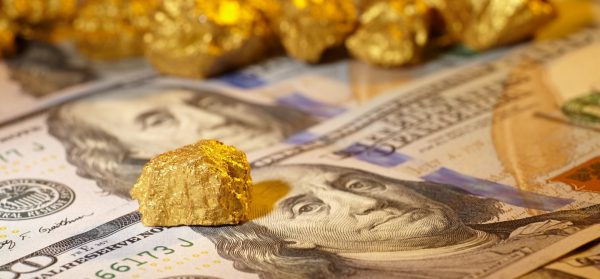Damned if you do, damned if you don’t, that’s just how Zimbabwe has been grappling with the dilemma of whether its own money should return earlier or not. Or rather be shelved for much longer, until such time that it would be ripe to bring back the local dollar.
By Justice Zhou
The subject has for long been a burning issue. In recent weeks, it has been trending amid swirling rumours that the country was on the verge of reintroducing its own currency, backed by gold this time, nearly a decade after it switched to the US dollar in order to rein in galloping inflation. However, it is not clear if authorities were already in the process of stockpiling reserves of the yellow metal to back the proposed money. The political stakes are high as the country heads for crucial national elections slated for the end of next month.
It obviously has been tempting for all the presidential hopefuls, particularly the frontrunners, to see the cash crisis as a key in the race for the top job. By the same token, the mining industry players, some of the hardest hit by the crisis, will find any developments that bring about sufficient liquidity to be a welcome relief.
Coupled with forex shortages, the absence of the local currency remains a major concern for miners whose operations have been thrown into disarray, as they struggle to secure equipment and spare parts, while experiencing delays in paying suppliers. It would be rather interesting to find that the sector actually takes the lead in digging its way out of the cash problems, supplying the gold that will be required to support the new currency.
Up until the greenback began to disappear early 2013, it looked as though the solution to the endless liquidity problems has been found, but alas. The bond notes, introduced in 2016, have not been helpful either. But the more things seem to change, the more they remain the same in Zimbabwe. But can gold provide the ultimate answer to the endless cash crunch?
“We are headed towards a catastrophe if the powers that be are not careful. I have warned before about the dangers of printing money and the bond note,” renowned journalist Hopewell Chin’ono said.
“The government is talking about bringing back the Zimbabwe Dollar to alleviate the cash crisis. It won’t alleviate anything! Your own currency is useless if you are not producing anything meaningful for export.
Ironically, the world completely abandoned the so-called gold standard way back in the 1970s, immediately switching to the US dollar as the newfound alternative reserve currency upon which countries would measure the strength of their own currencies.
Experts say some of the major benefits derived from this monetary system are that a valuable and fixed asset would back the money & its worth. That, in essence, provides a stabilising and self-regulating effect on the economy, as the government & its ability to print money would be limited only to certain quantities of gold. Eventually, it follows that with money printing only depended on the amount of bullion reserves, runaway inflation will thus be kept under control.
Nevertheless, conspiracy theory has it that the economic powerhouse now abuses its greenback as a tool to manipulate the global economy in its favour, whereas influencing political events in weaker nations for its geopolitical gains. For example, Zimbabwe has coincidentally been cited by critics as a case in point. They argue that the initial abundance of the US dollar during the tenure of the ZanuPF/MDC unity government between 2009 and 2013, and its sudden disappearance thereafter as proof that the country was being punished for former President Robert Mugabe’s anti-western rhetoric.
The mainstream opposition coalition has argued it was still too early to reintroduce the local dollar, saying the preliminary solution to the cash shortages alternatively lies in neighbouring South Africa’s rand. Former economic development minister Tapiwa Mashakada says joining the Rand Monetary Union would be a moot point.
“In any case our central bank is not using monetary policy instruments due to the dollarization of the economy. The use of the rand will vaccinate the central bank against quasi-fiscal operations which are harmful to the stability of the economy,” Mashakada said.
“At the end of the day, the MDC Alliance would want to see to it that banks have cash and that ATMs dispense cash. Banking queues will be a thing of the past. In summary the MDC Alliance will take Zimbabwe to the Rand Monetary Union, decommission bond notes, and address all the macroeconomic fundamentals inhibiting the re-introduction of the Zimbabwe dollar. This is our solution to the liquidity crisis playing out as cash shortages.”
Zimbabwe’s gold mining and trade legacy traces its history back to medieval times, with the ancient Munhumutapa Empire alleged to have boasted roughly 4 000 gold mines across the country. The empire’s mining activities saw tons of bullion ore being purified and later cast into jewellery and means by which to trade with Portuguese and Arabic explorers and other fortune hunters. Legend also has it that the southern African country was the biblical Ophir, in which King Solomon’s mines were domiciled. Today, the yellow metal still holds its place as one of the main contributors to Zimbabwe’s economy.
For the time being, the mining sector will be kept guessing as to whether the new currency is really on the way perhaps until after the elections. The Reserve Bank of Zimbabwe has pledged to abide by its duty to ensure timeous payments to miners from which it buys gold. It currently is supposed to have been paying 70 per cent that it owes partly in US and the remainder in local bond notes as bank transfer.It has since emerged, however, that the central bank is defaulting on early payments due to the worsening forex and bond notes crunch. Still, is gold the answer? That is the big question.




